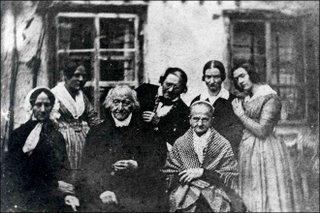SPF Panel #2 notes
Some delayed reaction to another panel last Monday presented by the Summer Play Festival, featuring some pretty smart and engaging personnel:Long Wharf's Gordon Edelstein, agent Morgan Jeness, director Kenny Leon, producer Robyn Goodman, and the Public's Oskar Eustis.
The conversation veered far from the panel's stated charge to discuss "Is New York Where It's At? (And, if not, where?)". But moderator David Cote (from Time Out) took advantage of the time to put some tough questions to individual panelists. For instance, asking Eustis to comment on the "Rachel Corrie" story and how he would have handled it. Eustis, in response, finally confirmed for the record (I believe for the first time) that he had indeed been pitched "Rachel Corrie" initially but claimed he "couldn't work out a deal" and so Alan Rickman & co. went to New York Theatre Workshop. Eustis reiterated previous comments in supporting NYTW and Jim Nicola's body of work and contribution to the theatre, but also that with "Corrie" he made a "mistake." The real news flash here was actually Eustis' annoucement that the Public and other theatres--including NYTW!--are planning "supporting activities" around the October commercial run of the play to "deepen the discussion" about Mideast issues and political theatre. So stay tuned for more on that, I suppose...
Eustis was also compelling in his concern for the increasingly "blurred line" between the commercial and nonprofit elements in theatre. "What's the 'not' in not-for-profit?" is the question we need to keep in front of us, he admonished. ("The public library doesn't have to make a profit," he added. Unfortunately, I could think of some local governments that disagree!)... He also made an interesting point in defense of producing "Stuff Happens" against grumbling about importing well-established Brits over homegrown work. While asserting we have no shortage of great living American dramatists, he also claimed David Hare's advantage was the "35 years of institutional support [i.e. at Britain's subsidized theatres] for large-cast public-issue plays" that could lead to a "Stuff Happens", when US writers are encouraged to writer smaller and smaller. Food for thought. When a European visitor in the audience expressed surprise that all the Artistic Directors were not heavily subsidized, Eustis shocked the crowd (insiders and outsiders alike, I think) in revealing that "three-quarters of one-percent of our Budget is government funded."
Robyn Goodman, as a consultant to the Roundabout, gave us a window onto what's going on over there with new plays, ever since they opened their new space, the Laura Pels, a smaller Off-Broadway venue (formerly the American Place Theatre) where they premiered "Mr. Marmelade" and "Pig Farm" this season--younger-spirited plays they might not normally take on. The Roundabout audience--accustomed to "classics with stars"--has apparently been giving Artistic Director Todd Haimes a tough time, to which they try to respond about the importance of investing in and nurturing new talent, or "seeing Feydeau at the beginning of his career." Which I took to be the first acknowledged difficulty in how the farcical "Pig Farm" is going over.
Some blame was passed around to critics (or to the power of critics) in stifling the chances of new work. Eustis claimed as evidence that the all-powerful seat of judgment at the Times is still that powerful that the greatest obstacle to producing "Stuff Happens" in New York was not its political content but the more influential commercial risk in producing a play Ben Brantley went on record as not liking in his London review. (And it helped decisively that Brantley changed his mind and gave thumbs-up to the Public's version.) Eustis took the critic-bashing occasion to continue prostletizing for free tickets, saying, "If you give the tickets away, nobody cares what the critics say." However, his theory seems contradicted by his very own "Macbeth" this summer, which got mixed notices and where it was apparently easy to get a ticket in line. I would counter that it's celebrity, not free tickets, that trumps bad reviews every time.
Cote--naturally poised to defend the critics!--made the more original and urgent point that the problem is more in Times coverage than the criticism itself, especially when it comes to Downtown theatre. As an example, he cited the Times overlooking of a buzz-worthy underground venture like "The Sewers" at the Ontological, but still sending someone to review a seemingly negligible Frankenstein musical at the less serious Wings company. Cote is really onto something here that I've noticed in the Times lately. I will hand it to them that they've stepped up their downtown coverage, and are reviewing more shows than they used to. But I also notice that they're not always reviewing the best downtown shows. Which leads me to conclude they must be giving into whoever has the loudest p.r. rather than their own nose for what's interesting.
Kenny Leon was asked a lot about the experience and success of his "Raisin in the Sun" on Broadway with black audiences. On the question of ticket prices, it was refreshing to hear him speak some sense: "Economics does play a part. At $100 you might see one play, but not six... Sometimes money is a problem. But people also have to know what we're offering. These kids spend $110 on some tennis shoes."... By the way, Cote did not pass on asking Leon how he really felt about working with P. Diddy. Leon gave an emphatic defense of the casting choice, arguing he auditioned personally for him, multiple times. But then he also provided a surreal narrative of how, as director, he entered into an unusally intense personal (and dependent) relationship with his star, where Diddy would take him around in his limo all night, going over the script in fine restaurants, going to church together on Sundays. Leon's message was all about how hard the man worked. The story was entertaining, though, because the dazzling details of a director enthralled by his far more famous star.
Those are all the notes I have. Anyone else there care to comment?











